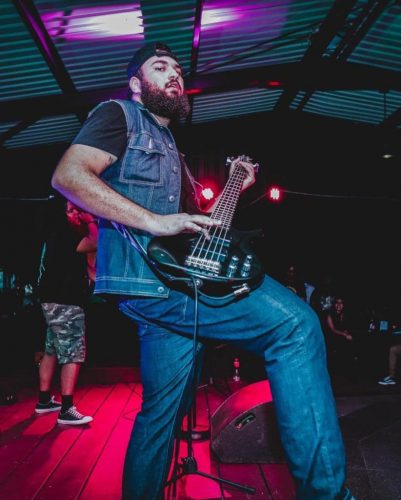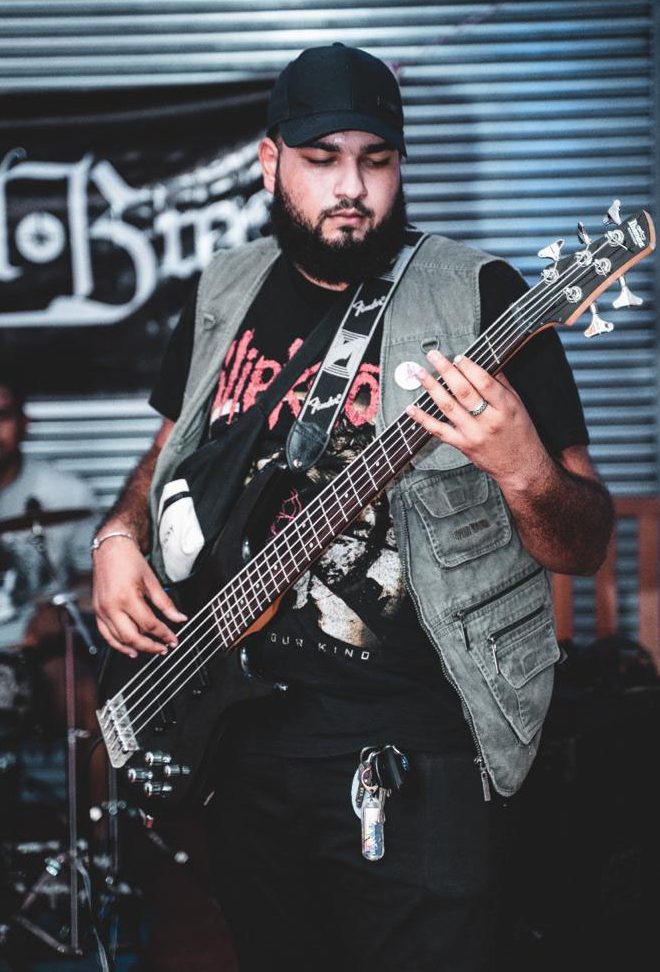By Rae Wiltshire
Nickolaos Vlachakis is a self-taught musician who honed his skills by reading books and undergoing online training via YouTube.
With a fascination for the guitar and bass, whenever he feels down, he turns to music for solace. Learning to play the guitar has become a means for him to uplift his mood, serving as a reminder that success is attainable through determination.
The guitar felt like a natural choice for Vlachakis, who developed a fondness for rock and roll before reaching his teenage years. He admired the sound composition of the bass and guitar in musical pieces, leaning more towards the bass.

Recognising his passion for music, his mother brought home a guitar for him to play and Vlachakis began experimenting with the instrument.
As he delved deeper into music, he realised that the guitar is a versatile instrument present in many musical compositions.
Now 22, Vlachakis has cultivated the versatility of the guitar to align with his diverse musical tastes. While his initial interest was sparked by rock and roll, he has since expanded his horizons across various genres. These include afrobeats, 1950s and 60s Jazz, LoFi (short for Low Fidelity), dancehall, and many other musical forms spanning different periods. For Vlachakis, this broad musical education serves as a tool for self-development and motivation. He emphasises the importance of embracing variety for continuous inspiration, stating, “To limit yourself to only one thing is a form of elitism that leads to having a closed mind.”
Currently, Vlachakis is predominantly recognised for his work in the genres of LoFi and Indie music. He finds this recognition endearing, as these genres serve as an umbrella term with ample room for exploration. In the realm of LoFi, imperfections in a composition are considered to have artistic merit rather than something to be polished. On the other hand, Indie music typically involves bands producing experimental music on a modest budget for a non-mainstream audience.
The concept of embracing exploration in various genres has transcended into Vlachakis’s personal life. He elaborated on how being open-minded led him to form unexpected friendships with individuals he never imagined would become friends. Despite being primarily involved in a rock band, he forged connections with musicians specialising in Christian music, Reggae, Soca, and other diverse genres. Despite their varied musical preferences, he discovered a common thread that bound them together: “We all have a love of one thing; creating sound waves that make people feel happy.”
Vlachakis highlighted the potential importance of this shared love for Guyana’s development, particularly in light of the country’s growing oil industry, which he believes will boost the hospitality industry. “That industry will need live entertainment, and Guyana needs to be in a position to prepare people to be a part of that workforce if they decide they want to pursue it,” he explained. He also noted positive growth in Guyana’s music scene, describing it as a tight-knit community where musicians are familiar with each other. This familiarity often leads to the sharing of information about musical gigs. Additionally, Vlachakis observed that while the country boasts a wealth of talented musicians proficient with their instruments, their talents are not fully utilised to showcase their potential in the hospitality and tourism sector.
While the talent is undoubtedly present, Vlachakis emphasised the pressing need for more support, noting the scarcity of developmental schools for Guyanese musicians to attend and refine their craft. He expressed concern that the business community tends to undervalue these talented musicians, often overlooking the significant hours and financial investment required for practice and acquiring instruments. According to him, there exists a gap between artists and business professionals, rooted in a lack of understanding about the intricate process and dedication musicians put into their work, leading to a difficulty in empathising with their challenges.
To address this issue, Vlachakis proposes the implementation of a standardised structure that considers the expenses incurred by musicians. He advocates for a middle ground to be established, ensuring a livable wage from performances, akin to the compensation structure for other members of the workforce. This, he believes, would bridge the gap and create a fairer and more sustainable environment for musicians. Beyond external factors, Vlachakis asserts that artists play a crucial role in the development and sustainability of their craft. He believes that discipline and consistency are fundamental ingredients for artists aspiring to become household names. According to him, there is a profound sense of personal fulfilment when artists exhibit the discipline to create even during times of fatigue or lack of inspiration. “The simple act of making up your mind to get up and do it puts you in a completely different state of mind. It’s like you zone in, you focus, and your muscle memory starts to kick back in, and before you know it… you are in the mood to create again,” he explained. Additionally, he emphasised that serious improvement and growth necessitate making sacrifices to enhance one’s skills.
Improvement is also not solely an individual effort; support from loved ones also plays a significant role. Vlachakis fondly reminisced about his first rock performance at the age of 18, where many of his friends attended to support him, even though rock wasn’t their preferred genre. This gesture was particularly endearing for Vlachakis. “I find myself very grateful for the company I have kept into my young adult life,” he remarked, noting that some of those friends continue to show up to support him even today.
While deeply grateful for supportive friends, Vlachakis emphasised the importance of avoiding echo chambers where encouragement and compliments are constant. He stressed the need for constructive criticism, asserting that musicians benefit from feedback to enhance their craft. While friends who are not musicians can offer valuable perspectives, Vlachakis acknowledged that their critique might be limited to layman observations. He highlighted the significance of seeking feedback from more experienced and qualified individuals who can provide concrete guidance for improvement. “I would rather someone tell me something I don’t want to hear than someone who is just stroking my ego.”
Vlachakis admitted that he had to tame his ego to refine his performances, cautioning against the temptation to show off. Reflecting on his younger years, he shared that he initially wanted to stand out while playing but eventually learned the importance of serving the song’s intention. Understanding that playing in a unit requires a singular objective, he realised that deviating from the song’s purpose with personal intentions would diminish its impact.
Expressing hope for Guyana’s music industry to evolve as a cohesive unit, Vlachakis acknowledged the country’s abundant talent. However, he emphasised the need for easier access to facilities to facilitate industry growth. He also expressed a desire for more individuals to pick up instruments, recognising the dedication required to become a skilled musician.





